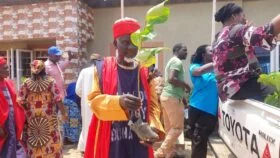The Bridge That Gap Initiative on Friday led a grassroots afforestation campaign in Kaduna State, distributing over 2,000 tree seedlings across communities in Chikun Local Government Area to bolster climate resilience.
The effort, carried out in partnership with Hope for Africa Initiative and supported by the Nigeria Conservation Foundation, marked the completion of the first phase of a 5,000-tree planting programme under the Nigeria Climate Justice Alliance.
Programme Officer of Bridge That Gap, Zinta Apkpoko, said the campaign was designed to promote community-driven nature-based solutions to climate change.
“Tree planting is not just about ecology. It is about health, livelihoods, and climate justice,” he said.
At the closing event, traditional ruler Malam Ishaku Yari, Sa Gbagyi, oversaw the distribution of 1,300 forest trees and 700 fruit trees to public institutions and individual households. He welcomed the initiative and encouraged continued greening efforts around his palace and nearby communities.
“Let this street provide shade for everyone. A green environment secures our future,” he said.
Recipients of the seedlings included schools, religious centres, health facilities, and residents. The tree species ranged from climate-resilient varieties such as teak, eucalyptus, and gmelina, to economically beneficial fruit trees like guava, soursop, cashew, orange, palm, and date palm.
Lydia Saleh of the Network of Civil Societies in Environment commended the initiative for promoting local engagement in climate action.
“This campaign offers communities a practical and symbolic way to respond to the climate crisis,” she said.
One beneficiary, Rose Otitoyomi, described the programme as life-changing.
“These trees will feed my family, clean the air, and give me something valuable to nurture,” she said.
Shadrach Hassan, Wambai Rido Gbagyi, said the effort had inspired him to advocate tree planting within faith-based organisations.
According to Bridge That Gap, the strategy ensures inclusive participation, assigning forest trees to public spaces and fruit trees to households—blending environmental protection with economic empowerment.
The organisation added that the next phase of the campaign would extend outreach to more vulnerable communities while promoting sustainable land use and ecosystem restoration.


